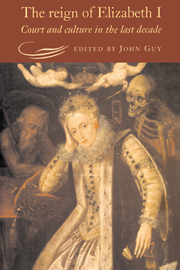Book contents
- Frontmatter
- Contents
- List of figures
- Preface
- List of contributors
- List of abbreviations
- Introduction The 1590s: the second reign of Elizabeth I?
- 1 The patronage of the crown in Elizabethan politics: the 1590s in perspective
- 2 Regnum Cecilianum? A Cecilian perspective of the Court
- 3 Patronage at Court, faction and the earl of Essex
- 4 Peers, patronage and the politics of history
- 5 The fall of Sir John Perrot
- 6 The Elizabethan establishment and the ecclesiastical polity
- 7 Ecclesiastical vitriol: religious satire in the 1590s and the invention of puritanism
- 8 Ecclesiastical vitriol: the kirk, the puritans and the future king of England
- 9 Social strain and social dislocation, 1585–1603
- 10 Lord of Liberty: Francis Davison and the cult of Elizabeth
- 11 The complaint of poetry for the death of liberality: the decline of literary patronage in the 1590s
- 12 Summer's Last Will and Testament: revels' end
- 13 The theatre and the Court in the 1590s
- Index
11 - The complaint of poetry for the death of liberality: the decline of literary patronage in the 1590s
Published online by Cambridge University Press: 06 January 2010
- Frontmatter
- Contents
- List of figures
- Preface
- List of contributors
- List of abbreviations
- Introduction The 1590s: the second reign of Elizabeth I?
- 1 The patronage of the crown in Elizabethan politics: the 1590s in perspective
- 2 Regnum Cecilianum? A Cecilian perspective of the Court
- 3 Patronage at Court, faction and the earl of Essex
- 4 Peers, patronage and the politics of history
- 5 The fall of Sir John Perrot
- 6 The Elizabethan establishment and the ecclesiastical polity
- 7 Ecclesiastical vitriol: religious satire in the 1590s and the invention of puritanism
- 8 Ecclesiastical vitriol: the kirk, the puritans and the future king of England
- 9 Social strain and social dislocation, 1585–1603
- 10 Lord of Liberty: Francis Davison and the cult of Elizabeth
- 11 The complaint of poetry for the death of liberality: the decline of literary patronage in the 1590s
- 12 Summer's Last Will and Testament: revels' end
- 13 The theatre and the Court in the 1590s
- Index
Summary
The issue of literary patronage is important for all students of the reign of Elizabeth I to address, as patronage is the site where the mechanisms of Literature's rôle in the ordering of society can be observed. Literature is potentially a very powerful tool in the political process, for it can imaginatively articulate prevailing cultural, ideological and social values in such a way as either to elicit assent to them, or else to serve as a focus for questioning, dissent and resistance. The earlier Tudor monarchs seem fully to have appreciated this, as both Henry VII and Henry VIII took pains to harness the political potentiality of writers. Henry VII imported Continental poets such as Bernard Andre and Pietro Carmigliano to embellish his exploits with complimentary verses and humanist historians such as Tito Livio dà Forli and Polydore Vergil to amplify his magnificence by writing accounts of his life and reign for a Continental audience. Similarly, Henry VIII hired John Skelton as orator regius to mark significant state occasions (such as royal victories in battle, births, and deaths) with appropriate verses, and sponsored a variety of prose propagandists from Thomas More to Thomas Starkey and Richard Morrison to present the stance of his administration on issues relating to the Reformation. Given the assiduous attention that the first two Tudors devoted to literary patronage as a means of magnifying their dynasty, it is all the more startling that Elizabeth I became progressively less inclined to dispense it, so that by the final decade of her reign very few writers were attaining the rewards they thought they deserved, whether financial or otherwise.
- Type
- Chapter
- Information
- The Reign of Elizabeth ICourt and Culture in the Last Decade, pp. 229 - 257Publisher: Cambridge University PressPrint publication year: 1995
- 5
- Cited by



